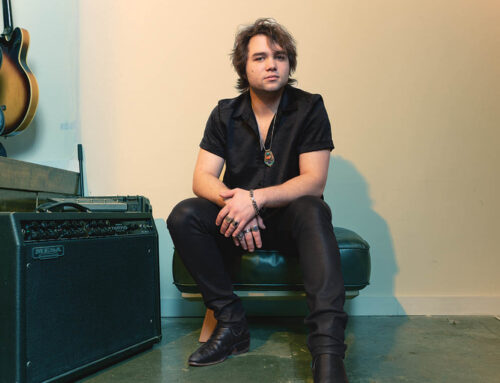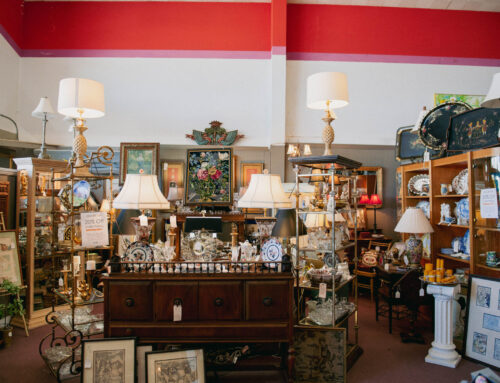Led by local apiculturists, Advocate photographer Danny Fulgencio looks at the lives of bees around Preston Hollow, their dwindling population and how it all impacts our lives.
Brandon and Susan Pollard herd honeybees. “Urban bee-wrangling,” they call it. Beyond being honey purveyors, the Pollards, via their Texas Honeybee Guild, save residential colonies from extermination, offer public education on the importance of bees and rally on their little charges’ behalf as environmental activists. As the Pollards often attest, bees are responsible for about 30 percent of our food. They pollinate more than 100 species of fruits and vegetables. Without them, we are in trouble. And that’s where we are headed, they say. In recent years, bee populations have been crushed by insecticides, disease, parasites and the enigmatic colony collapse disorder, a phenomenon that has caused the mysterious and widespread disappearance of worker bees. Last year proved especially brutal for the Pollards and their bees: The couple estimates they lost 60 percent of their hives, often after city-backed trucks and planes sprayed swaths of Dallas with neurotoxin to combat disease-carrying mosquitoes, which incidentally also threatens the humble bee. With mosquito season upon us, the Pollards attempt to rebuild their colonies while bracing for another possible round of chemical warfare.
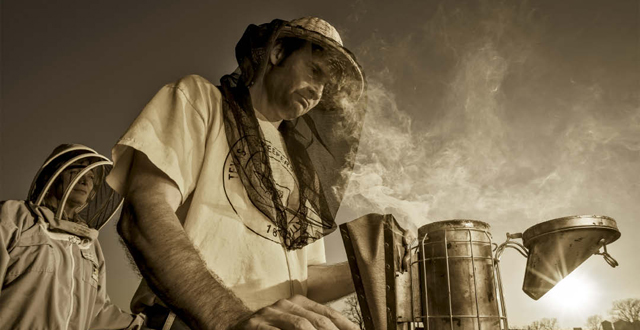
SOOTHING SMOKE Brandon and Susan Pollard, founders of the Texas Honeybee Guild, use a smoker while tending to hives at the John Bunker Sands Wetland Center just outside the city. Smoke sedates the insects, the beekeepers say, because they are hardwired to conserve energy for flight when they anticipate a hive fire. Bee smoking is an ancient practice — 15,000-year-old cave paintings show people sedating bees with smoke. Photo by Danny Fulgencio
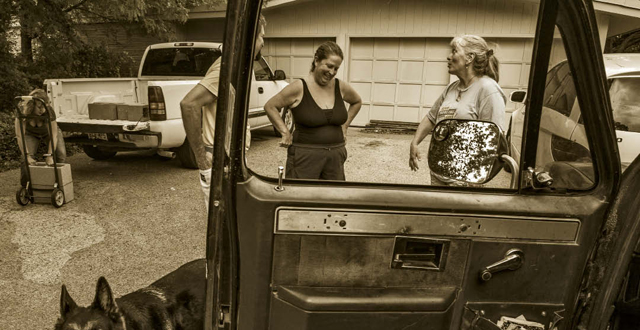
RELOCATION EFFORT The Wischkowsky family taps Brandon and Susan Pollard to remove bees from their residence. At just over an acre, the Preston Hollow property offers a botanical catalog of passion vines, strawberry gomphrena and cherry laurels and is home to two feral hives squatting in the walls between brick and tile. The Pollards rescue bees less often than they did years ago — they are busy trying to keep their existing colonies alive. Unlike exterminators, the Pollards take great pains to relocate feral hives when possible. Photo by Danny Fulgencio
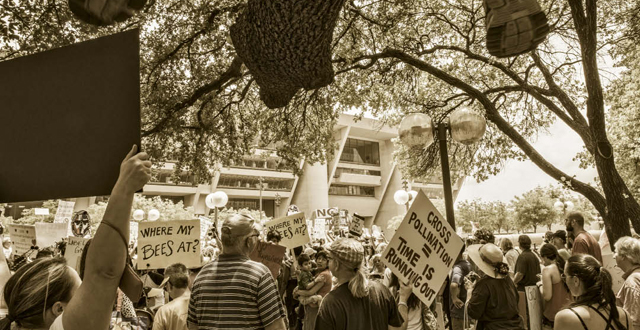
LET BEEDOM RING Protesters oppose Monsanto, bioengineers of agricultural chemicals. A thousand strong, protesters wind from City Hall toward the Farmers Market and back. Monsanto opponents blame the corporation, among some others, for the drastic reduction of bee populations. The company has publicly denied that its products are the problem and has announced its intentions to help find a solution. As the crowd thins, Brandon Pollard shakes his head, laments the lack of media presence and says, with a sad smile, “Preaching to the choir. Preaching to the choir.” Photo by Danny Fulgencio

LISTENING FOR LIFE In Preston Hollow, Brandon Pollard listens with a stethescope for a feral hive in the walls of the Wischkowsky home. He says extracting the hives will be a mentally draining job. “The physical work — the cutting and the sawing — that’s easy, but the big-picture aspect of all that in an emotional sense is the hard part.” Pollard estimates a pest control service could fetch more than $1,000 to destroy the bees. “We could charge that,” he says, “but that’s not why we’re doing this. We’re not chasing money. We’re chasing the bees. And that’s why it’s hard. Because we want to do what’s best for them.” Photo by Danny Fulgencio
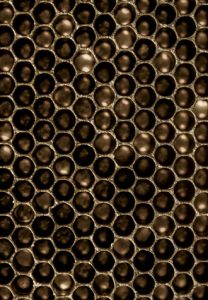
LOCAL HONEY In their efforts to sustain and re-populate the species, the Pollards and their honeybee guild oversee several honey-producing hives in backyards and gardens in and around the Preston Hollow area, and they monitor dozens of hives around the city. Honey from those hives is sold in neighborhood eateries and stores, such as Natural Grocers, and is known as Zip Code Honey. Photo by Danny Fulgencio
For more information on the Texas Honeybee Guild, call 214.826.8696



